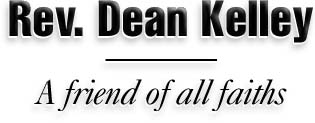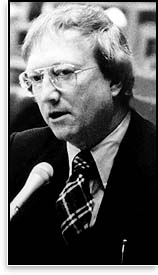



ecause we hold it for a fundamental and undeniable truth that religion ... can be directed only by reason and conviction, not by force or violence, the religion of every man must be left to the conviction and conscience of every man; and it is the right of every man to exercise it as these may dictate. That right is, in its nature, an inalienable right.”
Those words from James Madison in 1785 served as a credo for Dean M. Kelley, a 20th century theologian and champion of freedom, a man who dedicated his life to ensuring others, regardless of their faith, had the right to believe and worship freely.
In a career that spanned five decades, he wrote and filed scores of “friend of the court” briefs with the United States Supreme Court and other courts—works of such clarity and insight that he sometimes stunned attorneys when they learned the author was not a lawyer. He penned dozens of articles and several books, gave hundreds of media interviews, provided testimony before Congress and spoke internationally and well on church-state issues. A man known for his kindness and integrity, he was respected and even loved by innumerable colleagues and friends.
From 1960 to 1990, from his position as Executive for Religious Liberty for the National Council of Churches, he tirelessly served the cause of religious freedom. And he continued in an active semi-retirement as Counselor for Religious Liberty for the NCC.
On Sunday, May 11, 1997, the body of Dean Kelley succumbed to cancer after a 15-month battle. His spirit, never defeated, and his powerful legacy of wisdom and tolerance live on.
Seeking Consensus Without Sacrificing Principle
Dean Kelley stood tall throughout the last half of this century as a defender of the rights of people of all faiths. His courage and persistence have made him a symbol of religious freedom itself.
Mark Chopko, general counsel of the United States Catholic Conference, called him “a joyful, gentle man who brightened what he touched.” Marc Stern, attorney for the American Jewish Congress, noted that he “held on to his beliefs even when they weren’t popular.” “He had an ability to seek consensus without sacrificing principle,” said Forest Montgomery, counsel for the Office for Governmental Affairs of the National Association of Evangelicals.
Earl Trent, attorney for American Baptist Churches in the U.S.A., said, “No one had a greater influence on me in terms of the importance of religious liberty. This probably was the primary reason I decided to focus a good deal of my energy on issues of church and state and religious liberty and continue to be involved in those issues today.”
“Without Governmental ‘Help’ or Hindrance”
Born in Cheyenne, Wyoming, Dean Kelley graduated from Denver University in 1946 and married Maryon Hoyle on June 8 that year. He graduated from the Iliff School of Theology in 1949 and went on to serve United Methodist Churches in Colorado and New York before joining the National Council of Churches.
In 1965, he played a key role in formulating church-state safeguards in the Elementary and Secondary Education Act. Two decades later, he was instrumental in passage of the Equal Access Act of 1984, which enabled public school students to form religious clubs, a measure viewed as important for freedom of speech and freedom of assembly, in addition to freedom of religion.
His 1972 book, Why Conservative Churches Are Growing, and a 1977 work, Why Churches Should Not Pay Taxes, remain influential today.
“[W]hat religion furnishes to humankind is salvation – or the hope of it,” he wrote in the latter book, noting that, “After centuries of bitter trial and error, some governments have wisely come to the conclusion that the best way to handle the problem of religion is to leave it alone, neither preferring nor suppressing. The founders of the United States took this view—among the first in the world to do so—and made admirably gingerly provisions for the carrying on of the religious function without governmental ‘help’ or hindrance without even the appearance of governmental sponsorship, favoritism, entanglement or duress.”
Condemning Deprogramming
Rev. Kelley was one of the first and most persistent critics of deprogramming, the abusive and often violent practice of forcing someone to abandon his or her chosen beliefs, one which has today fallen into disuse in the wake of numerous criminal convictions and civil court judgments against its proponents.
His view was endorsed by the National Council of Churches, which voted in 1974 to condemn the practice.
As he expressed it two decades ago, deprogramming had been attempted “on persons belonging to long-established religious bodies such as a female member of a Roman Catholic community in Canada and a male member of the Episcopal Church of the Redeemer in Houston; people belonging to a political group like the Socialist Labor Party; and even on persons not belonging to any group as in the case of two girls in Denver whom [deprogrammer Ted] Patrick was hired to bring back to the strict tutelage of their Greek Orthodox families.
“So who is safe?” he asked. “If someone doesn’t like the way you talk or act or the people with whom you associate, they can hire a deprogrammer to go after you, grab you by force, take you off to a secluded place, and work you over until you consent to act in a manner acceptable to them.”
In a 1977 article in The Civil Liberties Review, he called deprogramming “protracted spiritual gang-rape” and “the most serious violation of our religious liberty in this generation.”
“It should be prosecuted,” he wrote, “not just as any other kidnapping, undertaken for mercenary motives would be, but even more vigorously, since it strikes at the most precious and vulnerable portion of the victim’s life, religious convictions and commitments"—a view which years later came to be accepted by law enforcement officials, prosecutors and judges.
A Vision of Full Religious Liberty for All
In 1993, after the deaths of more than 90 members of a Christian group near Waco, Texas, Rev. Kelley conducted personal interviews with survivors.
“The only time I saw Dean cry was when he was reporting to us about those interviews,” said the Rev. N.J. L’Heureux Jr., vice chairperson of the National Council of Churches’ Committee on Religious Liberty. “He concluded that a strong sense of faith bound those people together, and grieved the federal government’s cavalier, vicious treatment of them.”
Rev. Kelley wrote articles attacking actions by federal officials that precipitated the disaster, including Waco: A Massacre and Its Aftermath, which stands as one of the best summaries of injustices against the victims and a powerful indictment of the unnecessary carnage.
As the culmination of extensive labor over the past 20 years, Rev. Kelley had nearly completed editing a definitive five-volume work, The Law of Church and State in America.
Colleagues will finish the treatise, on which he was still working for several hours a day up to the time of his death.
“We can take comfort in the fact that Dean Kelley’s vision of full religious liberty for all is finally taking hold,” said the Rev. Oliver Thomas, counsel for religious liberty of the National Council of Churches. “We are a genuinely pluralistic society in which we try to respect others’ viewpoints. He was a man of principle who understood that each of us has a stake in each other’s religious 

